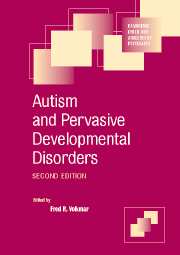Book contents
- Frontmatter
- Contents
- List of contributors
- Preface to the second edition
- 1 Diagnosis and definition of autism and other pervasive developmental disorders
- 2 Epidemiological surveys of pervasive developmental disorders
- 3 Psychological factors in autism
- 4 Communication and its development in autism spectrum disorders
- 5 Genetic epidemiology of autism spectrum disorders
- 6 The neurobiology of autism
- 7 Psychopharmacology
- 8 Behavioral and educational approaches to the pervasive developmental disorders
- 9 The outcome in adult life for people with ASD
- 10 Autism, social neuroscience, and endophenotypes
- Index
6 - The neurobiology of autism
Published online by Cambridge University Press: 19 August 2009
- Frontmatter
- Contents
- List of contributors
- Preface to the second edition
- 1 Diagnosis and definition of autism and other pervasive developmental disorders
- 2 Epidemiological surveys of pervasive developmental disorders
- 3 Psychological factors in autism
- 4 Communication and its development in autism spectrum disorders
- 5 Genetic epidemiology of autism spectrum disorders
- 6 The neurobiology of autism
- 7 Psychopharmacology
- 8 Behavioral and educational approaches to the pervasive developmental disorders
- 9 The outcome in adult life for people with ASD
- 10 Autism, social neuroscience, and endophenotypes
- Index
Summary
Introduction
The neurobiology of autism encompasses a wide range of neurophysiological, chemical, neuroimaging, and morphological research data. However, there is no unifying etiological concept from which to deduce and explain biological markers and the various causes and consequences of psychiatric and physical symptoms. For example, hypoactivation of the lateral right fusiform gyrus has been replicated as a neurofunctional marker, but it does not fully explain the social cognitive deficits in autism (Schultz et al., 2003) nor is it unique for autism (Quintana et al., 2003). Thus the relevance of obvious organic etiology to syndrome pathogenesis and the development of the affected child remains unclear. Some medical conditions arise during the course of autism (for example, seizures), whereas others may be present from very early in life and thus probably are more likely relevant to etiology
There are several challenges for reviewing the neurobiological basis of autism. Data are difficult to interpret because of small sample sizes, problems of diagnosis (particularly with severe mental retardation), a lack of reasonable control groups, a lack of replication studies, and contradictory findings due to the use of different classifying schemes and instruments. Examples of the latter are given by Eaves and Milner (1993) where they examine the relationship between two popular screening instruments for autism.
- Type
- Chapter
- Information
- Autism and Pervasive Developmental Disorders , pp. 179 - 220Publisher: Cambridge University PressPrint publication year: 2007
- 9
- Cited by

